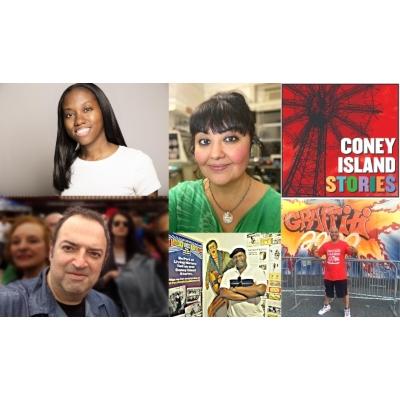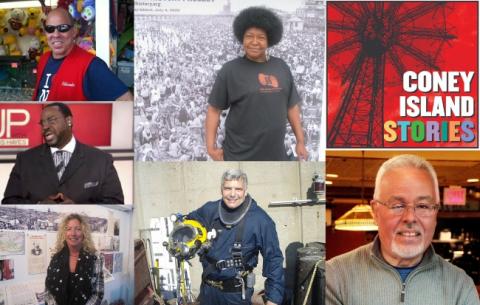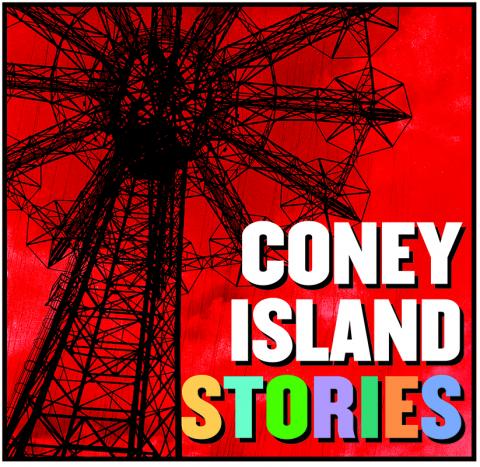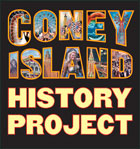
Season 2, Episode 8: Growing Up in the 2000s
Season Two’s theme is “Growing Up in Coney Island” through the decades, from the 1930s to the 21st century. In Episode Eight, the final episode of this season, we’re sharing the stories of narrators who grew up in Coney Island or came here from nearby neighborhoods, in the first decade of the 2000s.

Season 2, Episode 7: Growing Up in the 1990s
Season Two’s theme is “Growing Up in Coney Island” through the decades, from the 1930s to the 21st century. In Episode Seven, narrators who grew up here in the 1990s share stories of loss and change. They remember living in Gravesend Houses and Sea Rise apartments as well as on West 5th, West 8th and West 19th Streets. The Boardwalk, the Beach, Astroland, the Cyclone Roller Coaster and the Wonder Wheel were their playgrounds.

Season 2, Episode 6: Growing Up in the 1980s
Season Two’s theme is “Growing Up in Coney Island” through the decades, from the 1930s to the 21st century. In Episode Six, narrators who grew up here in the 1980s, or grew up coming to Coney Island from nearby neighborhoods, share their stories. They remember living in Gravesend Houses and O’Dwyer Gardens, high-rises overseen by the New York City Housing Authority, as well as apartments on West 19th Street and in Brightwater Towers. Astroland Park, Fabers Fascination Arcade, and Ruby’s Bar and Grill were their playgrounds.

Season 2, Episode 5: Growing Up in the 1970s
Season Two’s theme is “Growing Up in Coney Island” through the decades, from the 1930s to the 21st century. In Episode Five, Coney Islanders who grew up in the 1970s share memories of being the original tenants of Carey Gardens and O’Dwyer Gardens, newly built high-rise developments overseen by the New York City Housing Authority. They remember the razing of entire blocks in the West End during urban renewal, pervasive crime affecting their lives, and gangs like the Homicides and Seven Immortals inspiring the movie The Warriors. By mid-decade, New York City went broke and abandoned Coney Island. The one bright spot in the 1970s was Astroland amusement park’s two million dollar investment in new rides and sponsorship of air shows with the Army Golden Knights and the Air Force Thunderbirds.

Season 2, Episode 4: Growing Up in the 1960s
Season Two’s theme is “Growing Up in Coney Island” through the decades, from the 1930s to the 21st century. In Episode Four, Coney Islanders who grew up in the 1960s share memories of being the original tenants at Luna Park Houses and Trump Village, high rise co-ops that opened in the 1960s. They remember the last years of Steeplechase Park, a rising crime rate and urban renewal. In 1967, Mayor Lindsay declared the entire West End of Coney Island a poverty zone. More than 40 blocks were slated for condemnation. The one bright spot during the 1960s was the space age-themed Astroland Park. The park became the anchor for Coney Island, the glue that held it together while many businesses gave up and many property owners sold and moved away.

Season 2, Episode 3: Growing Up in the 1950s
Season Two’s theme is “Growing Up in Coney Island” through the decades, from the 1930s to the 21st century. In Episode Three, Coney Islanders who grew up in the ‘50s share their stories of living in apartments and over stores on Mermaid Avenue and its side streets. More than a thousand families were able to move into the two brand-new city-owned projects, Gravesend Houses and Coney Island Houses. Others made do with seasonal bungalows and rooming houses as year-round homes. World-famous Steeplechase Park was their neighborhood playground and television was a popular new indoor pastime.

Season 2 Episode 2: Growing Up in the 1940s
Season Two’s theme is “Growing Up in Coney Island” through the decades, from the 1930s to the 21st century. In Episode Two, Coney Islanders who grew up during the war years recall seeing gun emplacements on the boardwalk and soldiers camped in Kaiser Park. Their households had blackout curtains, ration coupons and victory gardens. Some had summer jobs in the amusement area despite being underage. After the war, their families took in relatives and boarders who were refugees and survivors of the concentration camps.

Season 2 Episode 1: Growing Up in the 1930s
Season Two’s theme is “Growing Up in Coney Island” through the decades, from the 1930s to the 21st century. In Episode One, Coney Islanders who grew up in the ‘30s recall hardships as well as simple pleasures. During the Depression, families from other New York City neighborhoods flocked to Coney Island. The rent was cheaper and the beach was down the block.

Season 2 Trailer: Growing Up in Coney Island
The Coney Island History Project launches Season Two of our oral history podcast Coney Island Stories on Tuesday, March 8th. This season’s theme is “Growing Up in Coney Island” through the decades, from the 1930s to the 21st century. The oral history narrators in Season Two describe growing up during the Depression and World War II, urban renewal (a narrator whose family was evicted calls it “urban removal”), the residential development of middle-income co-ops and public housing, and the decline of the amusement area and its eventual revival. Across the generations, their commonalities include the beach, the boardwalk, and jobs in the neighborhood, including the amusement area.

Season 1 Episode 11: Schools of Their Own
Episode 11 shares the stories of four dedicated and innovative teachers who founded schools of their own in Coney Island and adjacent neighborhoods in Southern Brooklyn. April Leong in the award-winning founder and principal of Liberation Diploma Plus High School, a small alternative high school in Coney Island. Dr. Tim Law established a program of free Chinese language classes for children at I.S. 96 Seth Low School in Bensonhurst. Irina Roizin realized her childhood dream of founding a ballet school, Brighton Ballet Theater School of Russian Ballet, on the campus of Kingsborough Community College in Manhattan Beach. Misha Mokretsov is head coach and owner of Coney Island's New York Fencing Academy, located just down the block from the History Project.
